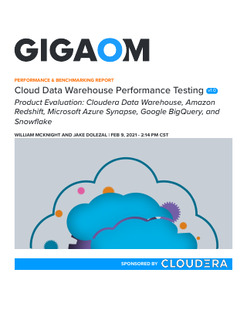Product Evaluation: Cloudera Data Warehouse, Amazon Redshift, Microsoft Azure Synapse, Google BigQuery, and Snowflake
Big data analytics platforms load, store, and analyze volumes of data at high speed, providing timely insights to businesses. Data-driven organizations leverage this data, for example, for advanced analysis to market new promotions, operational analytics to drive efficiency, or for predictive analytics to evaluate credit risk and detect fraud. Customers are leveraging a mix of relational analytical databases and data warehouses to gain analytic insights.
This report focuses on relational analytical databases in the public cloud because deployments are at an all-time high and poised to expand dramatically. The cloud enables enterprises to differentiate and innovate with these database systems at a much more rapid pace than was ever possible before. The cloud is a disruptive technology, offering elastic scalability vis-à-vis on-premises deployments, enabling faster service deployment and application development, and allowing less costly storage. For these reasons and others, many companies have leveraged the cloud to maintain or gain momentum.
This report outlines the results from an analytic performance test derived from the industry-standard TPC Benchmark™ DS (TPC-DS) to compare Cloudera Data Warehouse service (CDW)—part of the broader Cloudera Data Platform (CDP)—with four prominent competitors: Amazon Redshift, Azure Synapse Analytics, Google BigQuery, and Snowflake. Overall, the test results were insightful in revealing query execution performance of these platforms.
In terms of price per performance, Cloudera ran the Field Test 20% more cost-effectively than the nearest competitor, Amazon Redshift, 40% more cost-effectively than Azure Synapse, and 80% more cost-effectively than Snowflake. Cloudera ran the Field Test 5.5 times more cost-effectively than Google BigQuery.

